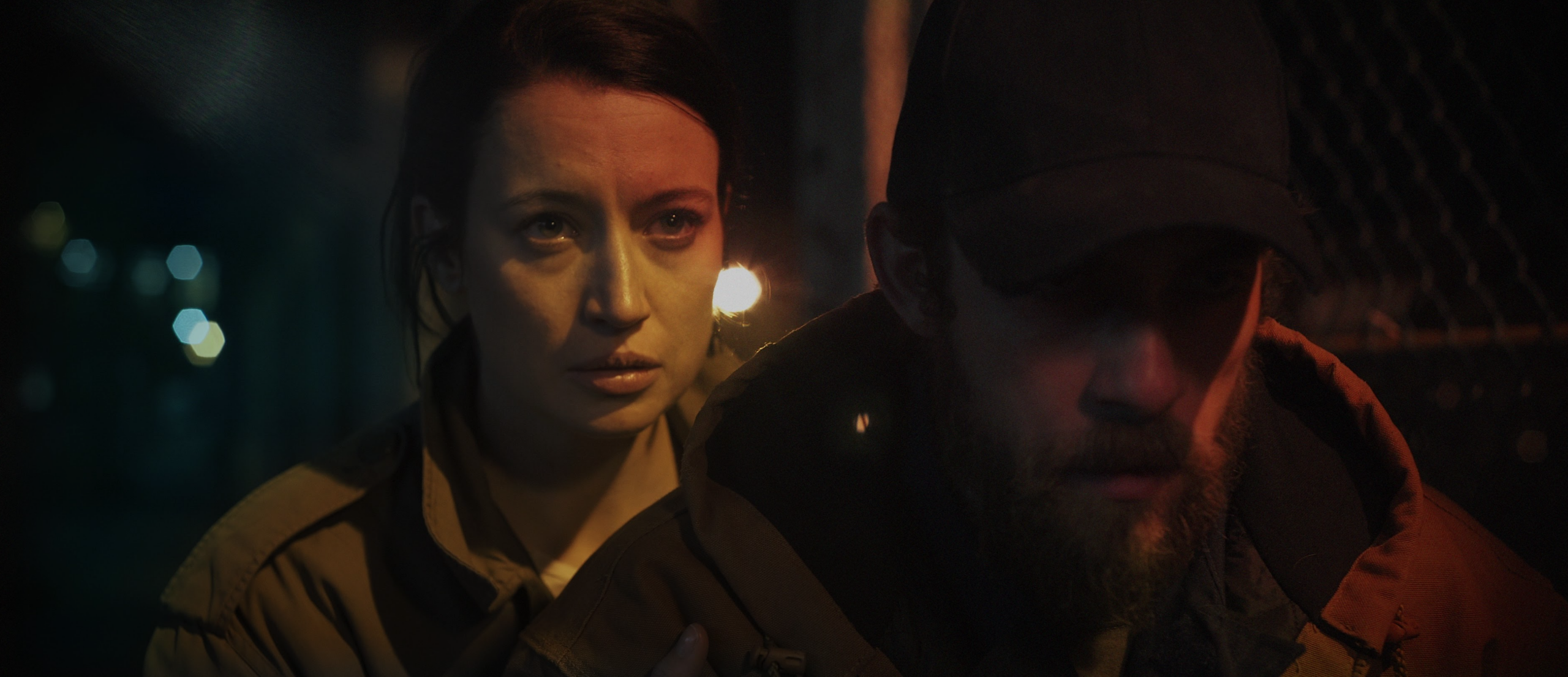In 2015, Perry Blackshear took the festival circuit by storm with his multiple award-winning debut feature They Look Like People, a slow-burning, lo-fi exercise in psychological horror propelled by an astonishing central performance from MacLeod Andrews. While Blackshear’s follow-up The Siren (2019) was not quite so well-received, When I Consume You marks a welcome return to form – a grubby and disquieting metropolitan nightmare in which two siblings are relentlessly pursued by someone (or something) determined to make their lives a misery. Our Culture reviews the film here as part of its selection from the 2021 Fantasia International Film Festival.
Daphne Shaw (Libby Ewing) is a nurse who is hoping to adopt a child, though her history of addiction is proving something of a stumbling block. Her brother Wilson (Evan Dumouchel) is a janitor looking to find work as a teacher, but his resume leaves a great deal to be desired. Struggling emotionally and financially, both siblings are living in sparse and cramped New York City apartments while trying to advance in life and let go of their traumatic past. Daphne is particularly troubled; she has long been menaced by a shadowy figure who seems to find her wherever she goes, leaving her bruised and beaten in the streets until their paths cross again. As the enigmatic stalker closes in on Daphne and resolves to make Wilson its next victim, the siblings try to find a way to rid themselves of it for good.
The great triumph of They Look Like People is its central metaphor. The tale of a single man who sincerely believes that everyone around him is slowly being replaced by otherworldly doppelgängers, it has a great deal to say about the paranoia bred by urban alienation; its pervading theme is that we can be surrounded by people and still feel utterly, dreadfully alone. In many ways, When I Consume You uses its monster to serve a similar allegorical function. Even in a city home to nearly nine million people, Daphne and Wilson have no one but each other – and even if they have a chance of defeating the malevolent entity that blights their lives, they will have to do so without external help.
The acute isolation of the film’s central characters is captured perfectly in its cinematography (by Blackshear himself, who also serves as writer, director, editor and producer). The New York of When I Consume You is a dark and desolate concrete labyrinth, an endless maze of empty sidewalks lit only by the fiery orange glare of streetlights. It’s a terrifyingly vacant and entirely unromantic vision of the city that would make William Lustig proud. The film’s internal scenes are closely shot to create a palpable sense of claustrophobia, as if the walls are forever closing in on Daphne and Wilson. The combined result is an unbearably hopeless atmosphere – one that is greatly aided by Mitch Bain’s dissonant, foreboding score.

But this is not just a story about the essential loneliness of the urban existence; it is also one about the struggle to survive in a capitalist society. It is implied that Daphne and Wilson have always been disadvantaged, lacking in education and financial resources. Much of the first act is dedicated to establishing their hopes and dreams (to start a family, to find a good job, to live a happy and stable life) before grinding them into dust. Every attempt to move forward, to “succeed,” is met with seemingly insurmountable resistance. With this in mind, the film’s monster – a creature determined to literally and figuratively beat its victims into submission until they finally give up hope – is the perfect metaphor for the systemic forces that ensure those at the bottom of the ladder stay there and suffer.
And that suffering is perfectly captured in the film’s two central performances. Dumouchel (making his third appearance in a Blackshear film) gives a heart-wrenching turn as Wilson, a grown man with the sensibility of a little boy lost in a world that wants to eat him alive. Meanwhile, Ewing imbues the downtrodden Daphne with a fierce and quiet defiance as she tries to keep her brother safe. The ever-excellent MacLeod Andrews – who starred in both of Blackshear’s previous pictures – takes a much reduced role here, and the less said about that role the better. Suffice it to say, though, that he steals every scene he appears in after making his entrance.
Leaving behind the rural setting of The Siren, When I Consume You ultimately feels very much like a thematic sequel to They Look Like People: an unnerving, cerebral horror film about what it means to feel alone amongst the urban masses. But, importantly, it does not simply repeat those themes – it deftly extends them. Daphne and Wilson feel alienated from society because society has failed them; they are two of life’s “losers,” but only because the game is rigged. Their battle against Daphne’s “stalker,” then, represents a steadfast refusal to give up – even if the odds are stacked against them.

